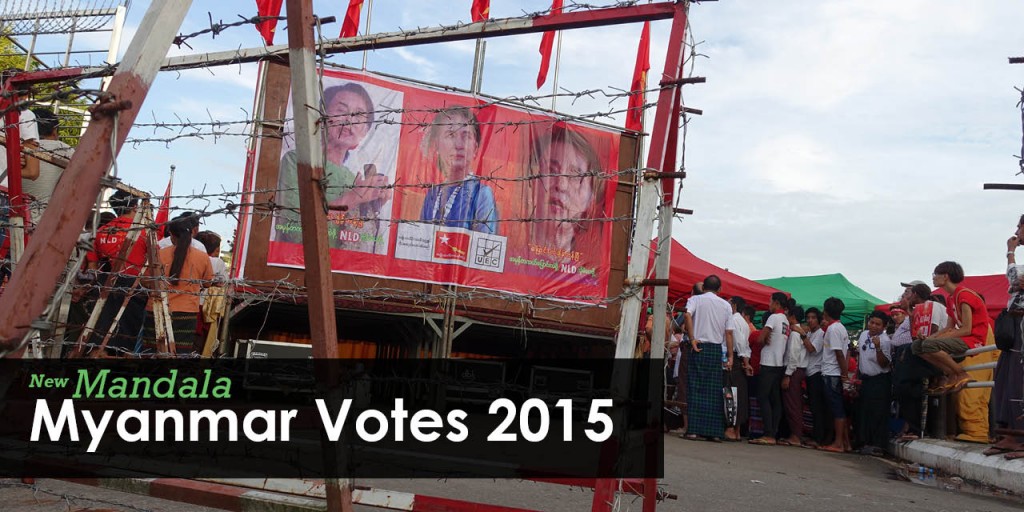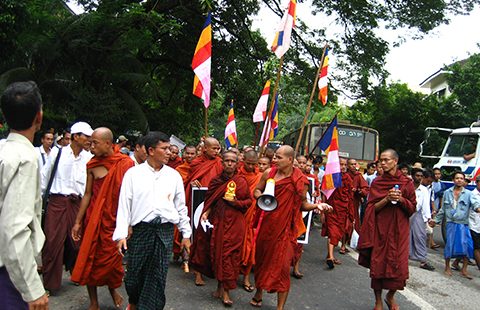
Civil society must play an important role in consolidating Myanmar’s democratic transition.
There are great expectations in Myanmar for continuing positive societal change after the 8 November national elections. In fact, there is a ferment in the air even greater than that at the time of the 2010 vote.
Many expect the opposition parties to sweep to power and hold high hopes of rapid improvement in the standard of their daily living. Having now experienced five years of democratically oriented policy change, Myanmar people are developing firm views on what changes they would like to see, whom they would like to govern the country, how reforms need to be achieved.
While much has been done in the past five years, none would deny that much more needs to be done to foster Myanmar’s continued evolution to democratic consolidation.
Myanmar civil society has taken an important role in these evolutionary processes. Whether we regard ‘civil society’ as that level of governance which operates between the governing and the governed in both advocacy and social welfare, or whether it is limited to non-government organisations (NGOs) carrying out their platforms by non-violent means, civil society in Myanmar is now more prominent in both its discourses and its projects than it was prior to the pre-2008–2010 era.
We should recall also that, as the Myanmar scholar Kyaw Yin Hlaing has reminded us, civil society in Myanmar never entirely disappeared, even during the time of greatest repression; it simply ‘went underground’ and survived in the numerous ‘book clubs’, ‘dinner clubs’ and other apparently innocuous societal gatherings.
If we look simply at numbers of NGOs operating openly in Myanmar, the ‘thickening’ of civil society may be gauged by the steep increase in their numbers, from an officially recognised list of some 50 in the pre-democratic era, to now many hundreds, if not thousands, most of which are domestic, Myanmar NGOs.
Their platforms also are very varied, from health oriented ones specialising in HIV/AIDS advocacy and service-provision, to community-empowerment and poverty alleviation programs, and democracy awareness training at grassroots levels.
That Myanmar civil society is now so prominent in its activities can be directly attributed to the greater ease with which it can carry out its projects and discourses, from advocating for educational reform to creating satiric cartoons. Indeed, the greater openness of the press, one of the key indicators of a civil society organised along democratic lines, has been a surprise to many observers.
Yet, with all these worthwhile developments, much remains of Myanmar’s governance fabric as it was prior to 2010. The arrest and punishment of these same cartoonists is just one case in point, which friends of Myanmar would wish not to happen.
By way of comparison, I always think that the satirical political cartoons in the Australian press, and indeed the British press, while hurtful to their objects and of wry amusement to their audiences, are indelible marks of robust democratic polities where civil society is deeply embedded in the social fabric, not just dancing on the stage seeking recognition.
As Myanmar’s reforms proceed and democratic governance becomes more instilled over time, Myanmar’s friends would hope that the artists behind these creative ventures would be encouraged rather than persecuted.
Among other more egregious issues related to how deeply Myanmar civil society is embedded in the country’s democratic consolidation is the future well-being of Myanmar’s ethnic minority peoples – especially the Rohingya, who, officially, do not exist under this name.
One of the many measures by which a democratic society is judged, is the way the polity treats its vulnerable groups, both of ethnic minority background and of other attributes of vulnerability. Building and sustaining a robust democratic policy requires deep commitment from all social groups, not just commitment to vote on regular occasions in what might be considered ‘free and fair’ elections. It also takes time and resources.
But most of all it requires a policy framework which gives pre-eminence to inclusiveness and the equitable distribution of resources across all socio-economic groups in that society, regardless of ethnic alignment. While one must welcome the ‘peace-processes’ in train to bring an end to the conflict with the Kachin people in northern Myanmar, a similar set of processes to redress the mistreatment of the Rohingya people is, at this time, absent, despite the report of the official government initiated inquiry with its set of balanced recommendations.
Indeed, running in the 8 November elections is an extremely nationalistic party from Rakhine State whose victory would bode very ill for these unfortunate people. Elections alone provide choices, but not democratic consolidation, which must be the aim of Myanmar’s citizens and its civil society groups.
If Myanmar is to be judged a ‘civil society’ and Myanmar civil society is to contribute positively to its democratic consolidation, an inclusive policy framework which supports equal opportunities for all the people living in Myanmar needs to be developed.
Contesting exclusionary Buddhist nationalism will be a challenge for Myanmar civil society, but one worthy of its calling, and which is essential to the country’s continued progress towards democratic consolidation.
Dr Helen James is an adjunct associate professor in the School of Culture, History and Language, ANU College of Asia and the Pacific.
This article forms part of New Mandala’s ‘Myanmar and the vote’ series.
 Facebook
Facebook  Twitter
Twitter  Soundcloud
Soundcloud  Youtube
Youtube  Rss
Rss 